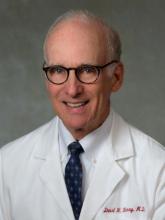Hematology/oncology requires clinicians to have some of the most difficult conversations in all of medicine. In part 2 of our 3-part series, we tackle how to talk about ending curative therapy even when the family wants to keep going.
These conversations are hosted by Ilana Yurkiewicz, MD, the host and producer of the Clinical Correlation segment and the author of Hard Questions, a monthly column at MDedge Hematology-Oncology. She is joined by the two residents who have been behind the Blood & Cancer show notes from the beginning, Emily Bryer, DO, and Ronak Mistry, DO, both of the University of Pennsylvania, Philadelphia.
David H. Henry, MD, editor in chief of MDedge Hematology-Oncology and the host of Blood & Cancer, also joins the podcast to talk about treatment discontinuation in multiple myeloma.
Timestamps:
- This week in Hematology/Oncology: 04:00
- Conversation: 08:00
Links:
- This Week in Oncology:
- Ilana Yurkiewicz, MD:
- Dr. Yurkiewicz is a fellow in hematology and oncology at Stanford (Calif.) University.
- Hard Questions
- Emily Bryer, DO
- Ronak Mistry, DO
For more MDedge podcasts, go to mdedge.com/podcasts
Email the show: podcasts@mdedge.com
Interact with us on Twitter: @MDedgehemonc
David Henry on Twitter: @davidhenrymd
Ilana Yurkiewicz on Twitter: @ilanayurkiewicz

